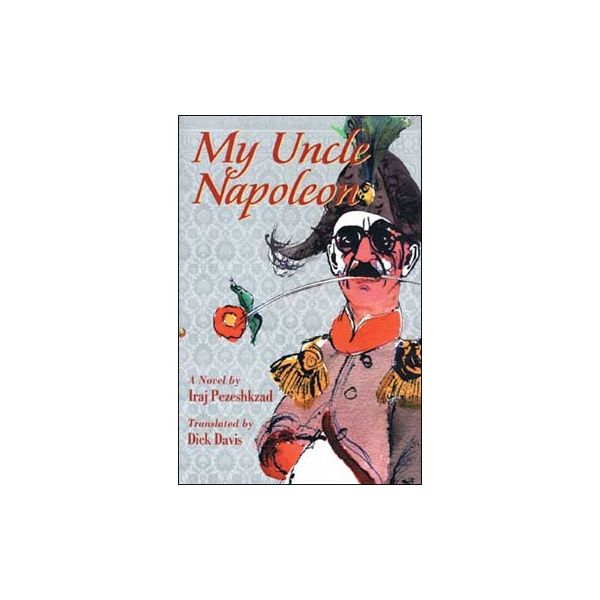FREE domestic ground shipping for eligible grocery orders of 60.00 (excluding ready-to-eat meals) and above!
**Orders containing refrigerated items are shipped weekly on Mondays, Tuesdays and Wednesdays only.**
Our free domestic ground shipping is handled by UPS. We do not guarantee any delivery times for ground shipping. Isolated delayed deliveries are possible.
Kindly Consider Overnight or Second Day shipping methods if you need to have a guaranteed delivery time frame.
"My Uncle Napoleon" - A Comic Novel by Iraj Pezeshkzad (Hard Cover)
$59.99
Published Date: June 1, 1996
Language English
Dimensions 6 1/8 x 9 1/4
Pages 512
ISBN No 1933823755
“The existence in Persian literature of a full-scale, abundantly inventive comic novel that involves a gallery of varied and highly memorable characters, not to mention scenes of hilarious farcical mayhem, may come as a surprise to a Western audience used to associating Iran with all that is in their eyes dour, dire and dreadful.” (From the Preface)
Availability:
In stock
SKU
PBM-BK-562050
Set in a garden in Tehran in the early 1940s, where three families live under the tyranny of a paranoid patriarch, My Uncle Napoleon is a rich, comic and brilliantly on-target send-up of Iranian society. The novel is, at its core, a love story. But the young narrator’s delicate and pure love for his cousin Layli is constantly jeopardized by an unforgettable cast of family members and the hilarious mayhem of their intrigues and machinations. It is also a social satire, a lampooning of the widespread Iranian belief that foreigners (particularly the British) are responsible for events that occurs in Iran. But most of all it is a very enjoyable, often side-splitting read that you wish did not have to end. First published in Iran in the early 1970s, the novel became an all-time best-seller. In 1976 it was turned into a television series and immediately captured the imagination of the whole nation-its story became a cultural reference point and its characters national icons. Dick Davis’ superb English translation has not only captured the uproarious humor of the original but has also caught the delicate, underlying vibrancy of the Persian.
The author, Iraj Pezeshkzad, was born in Tehran in 1928, and educated in Iran and France where he received his degree in Law. He served as a judge in the Iranian Judiciary for five years prior to joining the Iranian Foreign Service. He began writing in the early 1950s by translating the works of Voltaire and Molière into Persian and by writing short stories for magazines. His novels include Haji Mam-ja’far in Paris, and Mashalah Khan in the Court of Haroun al-Rashid. He has also written several plays and various articles on the Iranian Constitutional Revolution of 1905, the French Revolution, and the Russian Revolution. He is currently working as a journalist.
The translator, Dick Davis, brings a unique array of gifts to the challenges of translating Hafez and his contemporaries. In his own right, he is a poet of great technical accomplishment and emotional depth. He is also the foremost English-speaking scholar of medieval Persian poetry now working in the West. Numerous honors testify to his talents. In the U.K., he received the Royal Society of Literature’s Heinemann Award for his second book of poems, Seeing the World, in 1981; his Selected Poems was chosen by both the Sunday Times and the Daily Telegraph as a Book of the Year in 1989; and his collection Belonging was selected as the Poetry Book of the Year by The Economist in 2003. In the U.S., A Kind of Love—the American edition of his Selected Poems—received the Ingram Merrill prize for “excellence in poetry” in 1993. He has received awards for his scholarship from the Arts Council of Great Britain, The British Institute of Persian Studies, and the Guggenheim Foundation, and he is the recipient of grants for his translations from the National Endowment for the Humanities and the National Endowment for the Arts. Twice, in 2000 and 2001, he received the Translation Award of the International Society for Iranian Studies, and in 2001 he received an Encyclopedia Iranica award for “services to Persian poetry.” His translation of Ferdowsi’s Shahnameh: the Persian Book of Kings was chosen as one of the “ten best books of 2006” by the Washington Post.
Write Your Own Review




